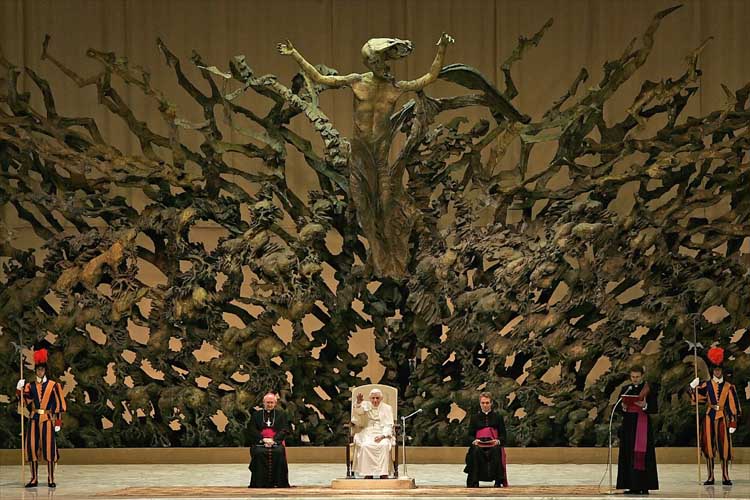Traditionally, Catholics have viewed Luther as a heresiarch, and the Lutheran break from Rome as a religious and civilizational catastrophe. More recently, in line with current ecumenical and pastoral initiatives, that view has softened.
The softening has been quite noticeable during the current pontificate. The pope recently took part in a joint liturgy with the Church of Sweden to commemorate the five hundredth anniversary of Luther’s rebellion. He has also suggested informally that a Lutheran married to a Catholic might legitimately decide to receive communion from a Catholic priest, and that disputes between Catholics and Lutherans over the doctrine of justification, the basic point at issue in Luther’s split with Rome, are now a thing of the past.
More generally, some papal language regarding law and mercy suggests movement away from the Catholic view that grace enables us to overcome our sins toward Luther’s view that it simply frees us from their consequences. Examples include the comment in Amoris Laetitia that
conscience can … recognize with sincerity and honesty what for now is the most generous response which can be given to God, and come to see with a certain moral security that it is what God himself is asking … while yet not fully the objective ideal.
So if you think it’s all you can do, that’s probably all God is looking for. Luther’s pecca fortiter, “sin boldly,” was based on a similar line of thought.
Are these moves in the right direction? The Church is hierarchical, and it is the pope and other clergy who are charged with teaching doctrine and determining appropriate pastoral and ecumenical efforts. Even so, laymen can hardly avoid forming their own views, and many Catholics find that recent ecumenical efforts have done more harm than good, as has a tendency to confuse “pastoral” with “accepting that people do whatever they do.”
Laymen have the right and even obligation to present these concerns. The issues matter a great deal, and not simply for churchly reasons. Our secular authorities are convinced they have the solution to all social and political problems, at least in principle, and can put it into effect through a global managed system that recognizes nothing human outside it, no authoritative God above it, no enduring human nature beneath it, and no significant history behind it other than the history of its own coming into being. Everything is a social construction, and they will do the constructing.
The project is unfounded, overreaching, and destructive, and Catholics should oppose it. But the ecumenical and interfaith movements, along with proposals for loosening sacramental discipline to accept common practices in the name of “accompaniment,” support it by sidelining specific religious principle. They turn it into something like the British monarchy, which lends historical depth and dignity to a modern utilitarian bureaucracy but does not affect its substance. So those who view current political and social trends as anti-Catholic and anti-human have an additional reason for concern regarding ecumenical and pastoral tendencies in the Church that support them.
Concern regarding the changing Catholic attitude toward Luther is all the more justified because he’s the man who initiated the Protestant split from Rome, a fundamental event in the emergence of the modern world, and a variety of liberal and radical movements have claimed him as an inspiration. So if we are troubled by the trend toward a global society organized through and through on wholly secular and increasingly intolerant principles, and want to understand where the trend comes from, we should know something about his thought and deeds and their consequences.
A recently published collection of essays put out by the Roman Forum, an organization founded by Dietrich von Hildebrand, can help. Luther and His Progeny: 500 Years of Protestantism & Its Consequences for Church, State, and Society includes pieces by a dozen European and American scholars of varying backgrounds, each with his own outlook and concerns, but all troubled by the man, the movement he launched, and current efforts to enlist them, along with Catholicism, in a grand scheme of political, social, and religious unification. Each essay is independent of the others, but collectively they cover the basic issues that led Luther to reject the Church, as well as the effects of his rebellion on European thought and society.
Taken together they present the picture of a revolution in religion, politics, law, ethics, economics, and even the natural sciences, the effects of which profoundly shape our present world. At bottom, what seems to have led Luther to break with Rome was his overwhelming sense of guilt over his inability to keep the moral law. He was in a mess, and the Catholic road of humility, penitence, forgiveness, sacrament, grace, and sanctification didn’t seem to be working for him, so he decided that the world itself is one huge irreversible mess. Man is totally depraved, reason a snare, free will an illusion, and the Church can do nothing and so is fundamentally useless. To make matters worse, God himself is willful, incomprehensible, and even self-contradictory, since he is good but makes man incapable of anything but evil.
Under such circumstances what do we do, if it makes sense to ask the question when we have no inclination or ability to think or choose rightly? Basically, Luther’s answer was to rely wholly on the mercy of Christ, who might—or might not—choose to cover up our sins and accept us as justified even though we would inevitably remain as corrupt as ever.
These are not reasonable views. How, for example, is a God worthy of love, worship, and trust who condemns to eternal torment sinners he made incapable of acting otherwise, but then arbitrarily chooses some, who are no better than the others, for forgiveness and eternal bliss? The best that can be done for such views intellectually, one of the essayists suggests, is to view them as a precursor of German idealism, which treats contradiction as fundamental to reality and its dialectical resolution as the basis of the self-construction of the Absolute. At the transcendent level that means, as Luther put it, that “God must first become the devil before he becomes God.” And at the human level, it means faith goes through radically different stages, with the transitions involving overwhelming temptations to unbelief and blasphemy, and ultimate resolution not possible in this world.
Some people think that sort of explanation makes sense, others don’t. A more psychological and likely more comprehensible approach that some have recently proposed is to portray him as a “mystic of mercy,” overwhelmed by the infinitude of divine grace, whose words cannot be taken literally. (Muslims take the same approach with their own mystics, whose words are rarely compatible with orthodox Islam.)
That approach may explain something of the man, but not the movement he started: people don’t look to the incoherent outbursts of mystics for practical tips on the reform of Church, State, and doctrine, but that’s exactly what Luther offered, and what people took from him.
The specifics are complicated. His thought wasn’t coherent, so people took from it what suited them. At bottom, though, denying the practical effectiveness of religion tended strongly to liberate secular affairs from religious concerns, and destroy the authority and the sacramental structure of the Church. And that, it appears, was the reason for the success of his rebellion. By insisting on the irrelevance of divine law to what men actually do, Luther enabled secular powers to shake off the authority of the Church, set themselves up as absolute within their domains, and incidentally enrich themselves and their supporters with the property that an ineffectual Church could no longer justify possessing.
All of which remains relevant today. Secular authorities still don’t like religious limitations, so if a contemporary religious leader wants to exchange scorn for adulation, all he has to do is ignore distinctions, loosen restrictions, and proclaim mercy without penitence or emendation of life. Neither talent, virtue, nor rational coherence is needed, only a willingness to go along in order to get along. And there are many high-ranking churchmen who are eager to accept the deal.
Editor’s note: Pictured above is Pope Francis with the General Secretary of the Lutheran World Federation Rev. Martin Junge (right) and the President of the Lutheran World Federation Bishop Munib Younan (far left) attending an ecumenical prayer service at the Lutheran cathedral in Lund, Sweden, Oct. 31. (Photo credit: CNS photo/Paul Haring)

_810_500_55_s_c1.jpg)


